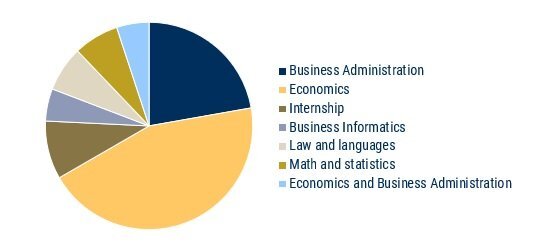You can complete the internship either before the start of your studies, during one of your mid-term breaks or during a semester (by applying for a semester on leave).
Our University also offers the following focus areas: Standard Focus, Business Administration, Business Information Systems, Information and Management Sciences, Business Analytics, Business and Economics Education Studies I and Business and Economics Education Studies II. You can change your focus during your studies.
By the way: There is a mathematics bridging course to help you prepare for your studies. We strongly advise all students to attend
More detailed information can be found in the module catalogueExternal link.
-
University entrance qualification
A university entrance qualification, such as a general secondary school leaving certificate, is required for admission onto the study programme.
More information on university entrance qualifications can be found here.
-
Language requirements
Admission and language requirements for applicants of foreign nationality and without German Abitur: www.uni-jena.de/en/study-orientation-international
Room 4.97
Carl-Zeiß-Straße 3
07743 Jena
Google Maps site planExternal link
Opening hours:
Monday - Friday 08:30a.m. - 11:30a.m.
Carl-Zeiß-Straße 3
07743 Jena
Google Maps site planExternal link
Opening hours:
Monday: closed
Tuesday: 08.30 to 11.30
Wednesday: 14.00 to 16.00
Thursday: 08.30 to 11.30
Friday: 08.30 to 11.30
Room 4.131
Carl-Zeiss-Str. 3
07743 Jena
Google Maps site planExternal link
Room 4.128
Carl-Zeiß-Straße 3
07743 Jena
Google Maps site planExternal link
University Main Building / SSZ
Fürstengraben 1
07743 Jena
Google Maps site planExternal link
Office hours:
We offer consultations in person, by telephone, and via Zoom. You can make an appointment by calling us on +49 3641 9-411111 (Mondays to Fridays from 9:00 to 11:00) or outside these office hours on +49 3641 9-411200. You can also use our remote help desk.
Consultation hours:
Mondays, Tuesdays, Thursdays and Fridays (9:00 to 12:20), Tuesdays (14:00 to 18:00), and Wednesdays and Thursdays (14:00 to 16:00).
Video chat: To the video chat – Zoom Videochat ZeitenMondays to Fridays (12:30 to 13:00) Password ZSB2020 Data protection informationpdf, 101 kb
University Main Building, Room E065
Fürstengraben 1
07743 Jena
Google Maps site planExternal link
Opening hours:
Mondays (10:00 – 12:00)
Tuesdays (13:00 – 15:00)
Wednesdays (10:00 – 12:00)
Thursdays (13:00 – 15:00)
Fridays (10:00 – 12:00)
You can also use our remote help desk at
www.uni-jena.de/service-ssz
or send us your enquiries by post.
Telephone hours:
Mondays to Fridays
(9:00 – 11:00)
Postal address:
Friedrich-Schiller-Universität Jena
Studierenden-Service-Zentrum
07737 Jena
University Main Building
Fürstengraben 1
07743 Jena
Google Maps site planExternal link


